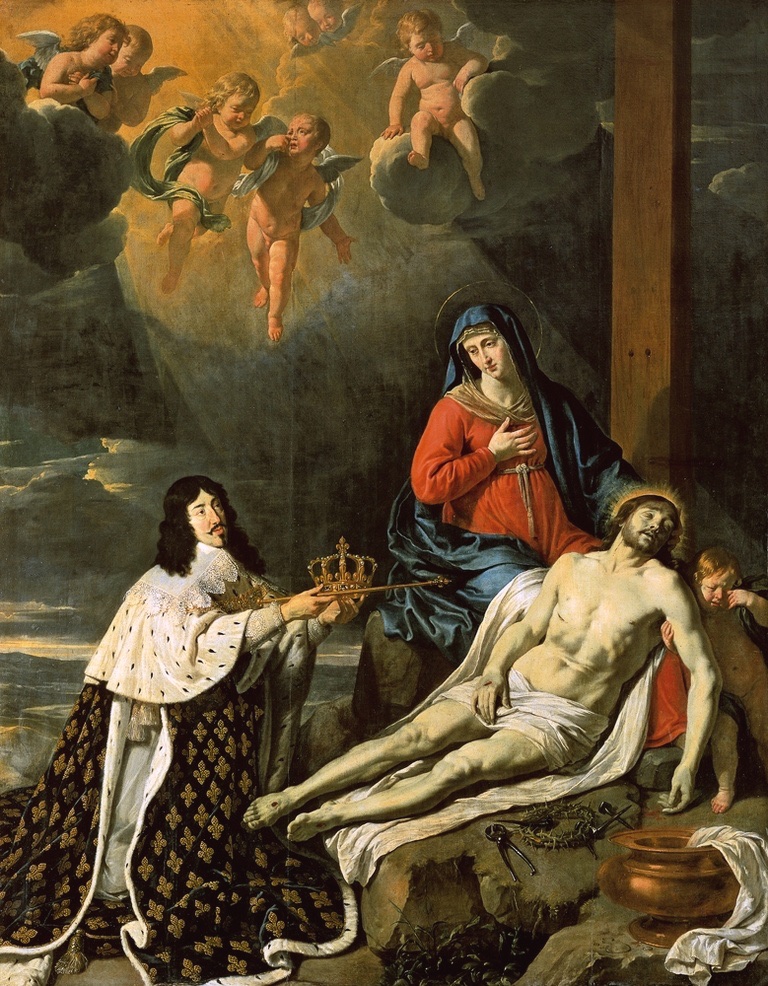Assumption of Our Lady
At Vespers, before the Procession
according to the Vow of King Louis XIII
Sermon of the Right Reverend Dom Jean Pateau
Abbot of Our Lady of Fontgombault
Fontgombault, August 15, 2020
Dear Brothers and Sisters,
My dearly beloved Sons,
On the evening of this day, so as to abide by the vow made by King Louis XIII, we are going to go on a procession in honor of Mary, and we shall sing the Litanies of Loretto, as well as the hymns Chez nous soyez Reine [Be Queen in our midst] and the Ave Maria of Lourdes.
This year, three new invocations have been added, according to the wish of the Holy Father, to the traditional ones in the Litanies: Mater misericordiæ, Mater spei and Solatium migrantium. Let us consider each of these new invocations.
Since we are within a few miles of Pellevoisin, the first invocation, Mater misericordiæ, “Mother of mercy”, cannot leave us unmoved, for in Pellevoisin, Mary indeed revealed herself as the “All merciful”. This new name, placed just after Mater Ecclesiæ, was used by John Paul II in his encyclical on mercy, Dives in misericordia. He writes:
Mary is also the one who obtained mercy in a particular and exceptional way, as no other person has. At the same time, still in an exceptional way, she made possible with the sacrifice of her heart her own sharing in revealing God’s mercy. […] No one has experienced, to the same degree as the Mother of the crucified One, the mystery of the cross, the overwhelming encounter of divine transcendent justice with love: that “kiss” given by mercy to justice. […] Mary, then, is the one who has the deepest knowledge of the mystery of God’s mercy. She knows its price, she knows how great it is. In this sense, we call her the Mother of mercy: our Lady of mercy, or Mother of divine mercy. (n. 9)
Mercy opens us up to hope. Christ is our hope, our only hope. Since she gives us Christ, Mary is the Mother of hope. It is from the interior of a tomb that light burst forth on the morning of Easter. Hope is the quintessential Christian virtue. We are too often tainted by a reigning pessimism; may Mary help us to gaze at the world with hope, to give thanks for what is fair, and to entrust to Christ that which should be restored.
The last invocation, Solatium migrantium, “Comfort of migrants”, is motivated by the worrying displacement of so many populations. Which man desires to forsake the soil of his forebears, to leave the propinquity of his family, to live as an eternally rootless man? Yet, we have to acknowledge it, in today’s world, the speed of travels, of information transfer, qualifies the attachment a man feels for the place he is in. Practically everything can be accessed from any place. What are then the bonds that will keep men, when the scourge of war, the temptation of a better life, incite them to go to other places? Also, migrants are not exclusively those who tread the roads of the earth. So many men embark on the virtual paths of internet, forsaking their families and friends for an insubstantial and elusive dreamland.
May the heart of Mary be the shelter where all migrants recapture the joy of a home, receive comfort, and recover their zest for life.
Let us therefore now sing for our heavenly Mother.
